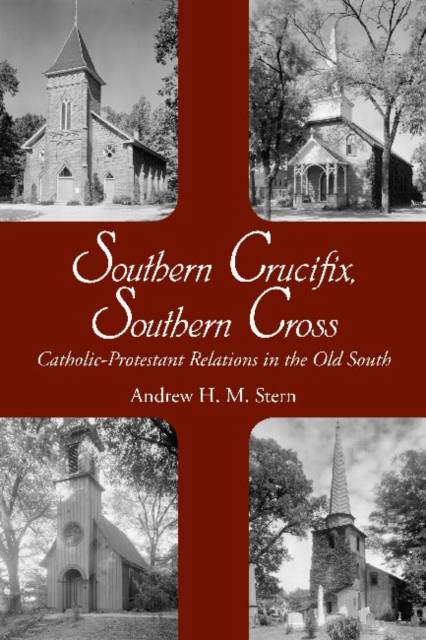
- Retrait gratuit dans votre magasin Club
- 7.000.000 titres dans notre catalogue
- Payer en toute sécurité
- Toujours un magasin près de chez vous
- Retrait gratuit dans votre magasin Club
- 7.000.0000 titres dans notre catalogue
- Payer en toute sécurité
- Toujours un magasin près de chez vous
43,45 €
+ 86 points
Description
Southern Crucifix, Southern Cross examines the complex and often overlooked relationships between Catholics and Protestants in the antebellum South.
In sharp contrast to many long-standing presumptions about mistrust or animosity between these two groups, this study proposes that Catholic and Protestant interactions in the South were characterized more by cooperation than by conflict. Andrew H. M. Stern argues that Catholics worked to integrate themselves into southern society without compromising their religious beliefs and that many Protestants accepted and supported them. Catholic leaders demonstrated the compatibility of Catholicism with American ideals and institutions, and Protestants recognized Catholics as useful citizens, true Americans, and loyal southerners, in particular citing their support for slavery and their hatred of abolitionism.
Mutual assistance between the two groups proved most clear in shared public spaces, with Catholics and Protestants participating in each other's institutions and funding each other's enterprises. Catholics and Protestants worshipped in each other's churches, studied in each other's schools, and recovered or died in each other's hospitals.
In many histories of southern religion, typically thought of as Protestant, Catholicism tends to be absent. Likewise, in studies of American Catholicism, Catholic relationships with Protestants, including southern Protestants, are rarely discussed. Southern Crucifix, Southern Cross is the first book to demonstrate in detail the ways in which many Protestants actively fostered the growth of American Catholicism. Stern complicates the dominant historical view of interreligious animosity and offers an unexpected model of religious pluralism that helped to shape southern culture as we know it today.
In sharp contrast to many long-standing presumptions about mistrust or animosity between these two groups, this study proposes that Catholic and Protestant interactions in the South were characterized more by cooperation than by conflict. Andrew H. M. Stern argues that Catholics worked to integrate themselves into southern society without compromising their religious beliefs and that many Protestants accepted and supported them. Catholic leaders demonstrated the compatibility of Catholicism with American ideals and institutions, and Protestants recognized Catholics as useful citizens, true Americans, and loyal southerners, in particular citing their support for slavery and their hatred of abolitionism.
Mutual assistance between the two groups proved most clear in shared public spaces, with Catholics and Protestants participating in each other's institutions and funding each other's enterprises. Catholics and Protestants worshipped in each other's churches, studied in each other's schools, and recovered or died in each other's hospitals.
In many histories of southern religion, typically thought of as Protestant, Catholicism tends to be absent. Likewise, in studies of American Catholicism, Catholic relationships with Protestants, including southern Protestants, are rarely discussed. Southern Crucifix, Southern Cross is the first book to demonstrate in detail the ways in which many Protestants actively fostered the growth of American Catholicism. Stern complicates the dominant historical view of interreligious animosity and offers an unexpected model of religious pluralism that helped to shape southern culture as we know it today.
Spécifications
Parties prenantes
- Auteur(s) :
- Editeur:
Contenu
- Nombre de pages :
- 265
- Langue:
- Anglais
- Collection :
Caractéristiques
- EAN:
- 9780817317744
- Date de parution :
- 30-11-12
- Format:
- Livre relié
- Format numérique:
- Genaaid
- Dimensions :
- 155 mm x 229 mm
- Poids :
- 544 g

Les avis
Nous publions uniquement les avis qui respectent les conditions requises. Consultez nos conditions pour les avis.






